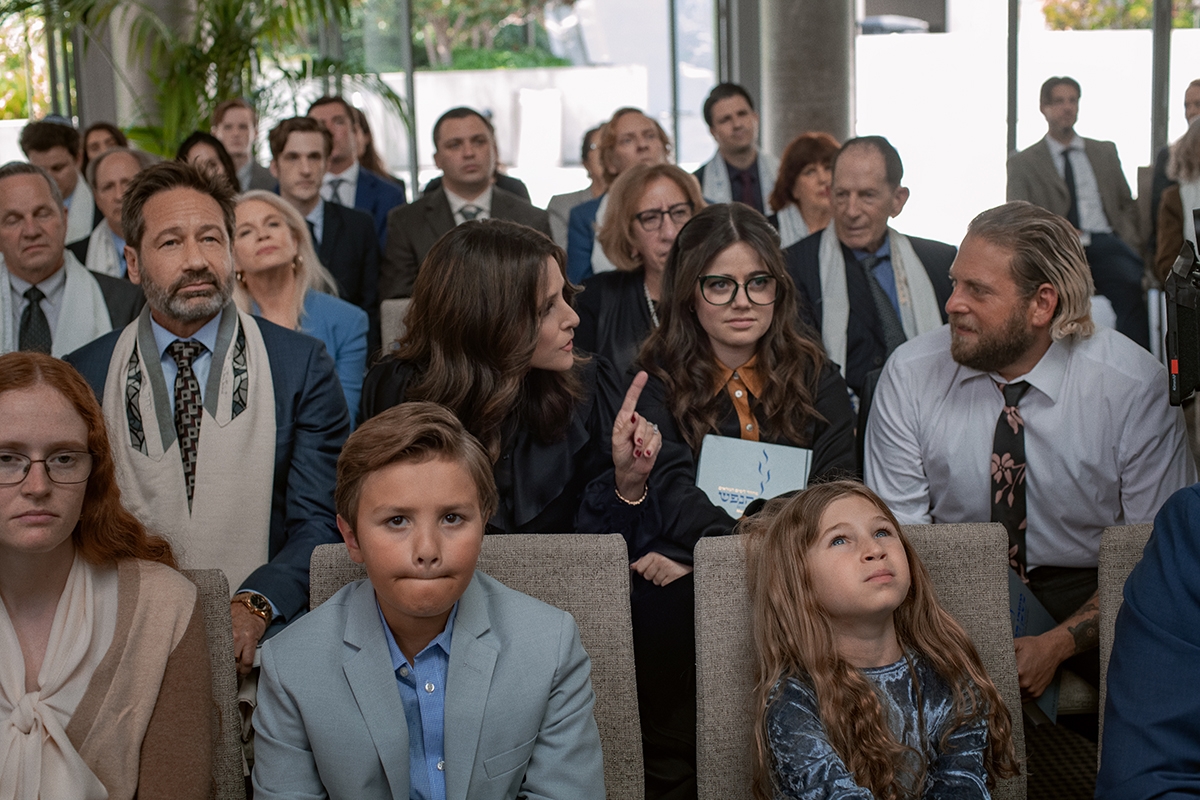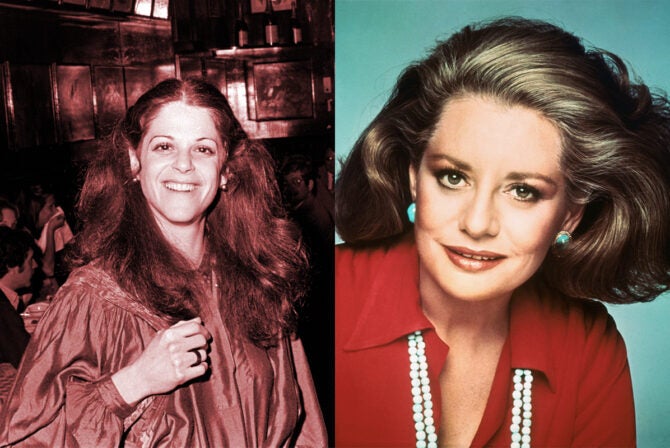“You’re treating her like a Black person, not the woman I love,” Jonah Hill‘s Ezra Cohen tells his Jewish mother in the new Netflix movie “You People,” referring to his girlfriend, Amira. Unfortunately, the movie is largely guilty of doing the same thing when it comes to its minority characters.
I had high hopes for this “Meet The Parents” and “Guess Who’s Coming To Dinner” mashup co-written by Hill and Kenya Barris, who’s best known for the TV series “black-ish” and its subsequent spin-offs. It’s a classic tale of star-crossed lovers: a Black woman whose family belongs to Nation of Islam falls in love with a white Jewish man, and all is fine and good — until their families meet. It has a truly in-cre-di-ble cast: Amira is played by Lauren London, and her parents are none other than Eddie Murphy and Nia Long. Hill’s parents are played by Julia Louis-Dreyfus and David Duchovny — and it also features Rhea Pearlman, the super funny Sam Jay and more. Add a Netflix budget to that list of stars, and you’re looking at an insane amount of potential.
But that potential is, ultimately, bogged down by cheap, tropey dialogue and flattened-out stereotypes for too many of its characters. For a movie made in 2023, I was almost convinced that some of the jokes and lines came directly from an AI script generator.
Specifically, its portrayal of Jews feels incredibly stale. We’ve been lucky to get more and more nuanced, three-dimensional representation in films and TV recently, but this movie doesn’t offer any kind of positivity, or really, much authenticity, about the American Jewish experience.
Aside from the fact that it peddles in so many Jewish stereotype — Ezra works in finance, his mom nags and nags, his bubbe kvetches about his tattoos, his Jewish dad is out of touch, the Jewish women he dates “just don’t get him” — it also deals in some serious misinformation about Jewish people and history.
It starts with the movie’s second scene, a Yom Kippur service which Ezra attends largely out of obligation. His grandmother, played by an underused Rhea Pearlman, tells him that he can’t be buried in a Jewish cemetery because of his tattoos. A little research could’ve shown that Bubbe is wrong — while tattoos may be a Jewish taboo in some circles, you can absolutely be buried in a Jewish cemetery with them. This little bit of misinformation is innocuous enough — and Ezra’s response to it is genuinely funny. But another line of misinformation has a little more concerning repercussions.
In what is definitely the most cringe-worthy scene in the movie, Ezra and Amira get their families together for dinner for the first time. The topic of how small the Jewish population comes up, with Eddie Murphy’s Akbar saying that the small percentage of Jews “seems to be doing pretty well right now.” The Cohens explain that it’s something they worked hard for after coming to America on a boat with nothing, just like everyone else. Amira’s mother responds, “Actually you kind of, sort of, came here with the money that you made on the slave trade like everyone else.”
The fact that she believes this could feel true to character — this particular branch of misinformation actually was popularized by a 1991 book published by the Nation of Islam. But the idea that Jews had any kind of central part in the slave trade is just plain false. Yes, there were Jewish slave-traders, but that’s not how the majority of Jews came to wealth or came to this country. Yet the movie does nothing to imply how wrong the comment is.
At that same dinner, Akbar says, “I don’t turn on the news every day and see people in yarmulkes getting shot by police just because they was out there minding their business.”
It’s a line that felt particularly jarring to me during a weekend when a Molotov cocktail was thrown at a synagogue a few towns away from mine, and during a time when antisemitic attacks, especially against visibly-presenting Jews, has been on the rise. You cannot compare police brutality to antisemitism, and you cannot compare slavery to the Holocaust — but you can practice allyship and understanding.
In many ways, the character that bears the brunt of stereotypical representation is Louis-Dreyfus’ Shelley. She is the quintessential “Jewish mom” we’ve seen in the media countless times — she meddles, she embarrasses, she gets too involved.
What is interesting about Shelly is that, when it comes to her treatment of Amira and her family, there’s definitely something that feels accurate there — her “overcompensation” that turns into microaggressions, her inability to see Amira as anything but the visual and cultural things that denote her as a Black person, fetishizing her and her friends’ hair (jeeesus).
What also feels true is that she doesn’t let Ezra finish any critique that he has of her behavior, instead deflecting and denying what she’s doing. White Jews often think that because of our minority status and of progressive Judaism’s history of allyship, we couldn’t possibly be perpetuating racism with our actions. It’s an experience all too familiar for Jews of Color in our communities.
Speaking of Jews of Color, the movie doesn’t seem to be aware of their existence, constantly pitting Black people against Jewish people as if there were no crossover there, despite celebrities like Tracee Ellis Ross and Rashida Jones, whom both starred in big Barris projects — or the actual star of the movie, Lauren London, who is both Jewish and Black. It would’ve been nice to acknowledge that Blackness and Jewishness aren’t always mutually exclusive, and would have been a simple solution to help the movie avoid many of the foibles it falls into.
So how did this bad representation come to be? After all, there were plenty of Jews in front of and behind the cameras. Well, the thing is, these characters might represent a very specific brand of Jewish experience in this country — one that Ezra’s character is undoubtedly part of, a particularly privileged, white LA milieux that struggles with its relationship to its Jewishness.
But that’s just not the universal truth about the American Jewish experience. And while the team behind the movie seemed preoccupied with getting the particularities of that Yom Kippur service right, they didn’t mind dealing in dangerous misinformation that does affect us all.
The makers of this movie couldn’t have known that they were going to release it at such a fraught time when it comes to antisemitism — especially with incidents that involve Black celebrities like Dave Chappelle and Kanye West, whose song plays not once, but twice in this movie, in the friggin’ interfaith wedding scene, no less. At the same time, it also perpetuates the fact that Black people have some kind of legacy of antisemitism, which has always been, more than anything, a product of white supremacy and Christian hegemony.
People may want to say that it’s not that serious — that this movie is meant to be an enjoyable rom-com. But too much of the dialogue feels heavy-handed and ultimately not that funny. Certain lines, like Ezra saying his sister looks like a “principal at the Hebrew school version of Hogwarts,” made me cackle. But largely the movie does a disservice to its very funny and very talented cast.
Still, I don’t want to rob anyone of any joy they might find in it. So if you watched “You People” and found laughter and respite in it, I’m glad for you. But also know that when it comes to Judaism, it is problematic representation at best, and harmful perpetuation of misinformation at worst.








